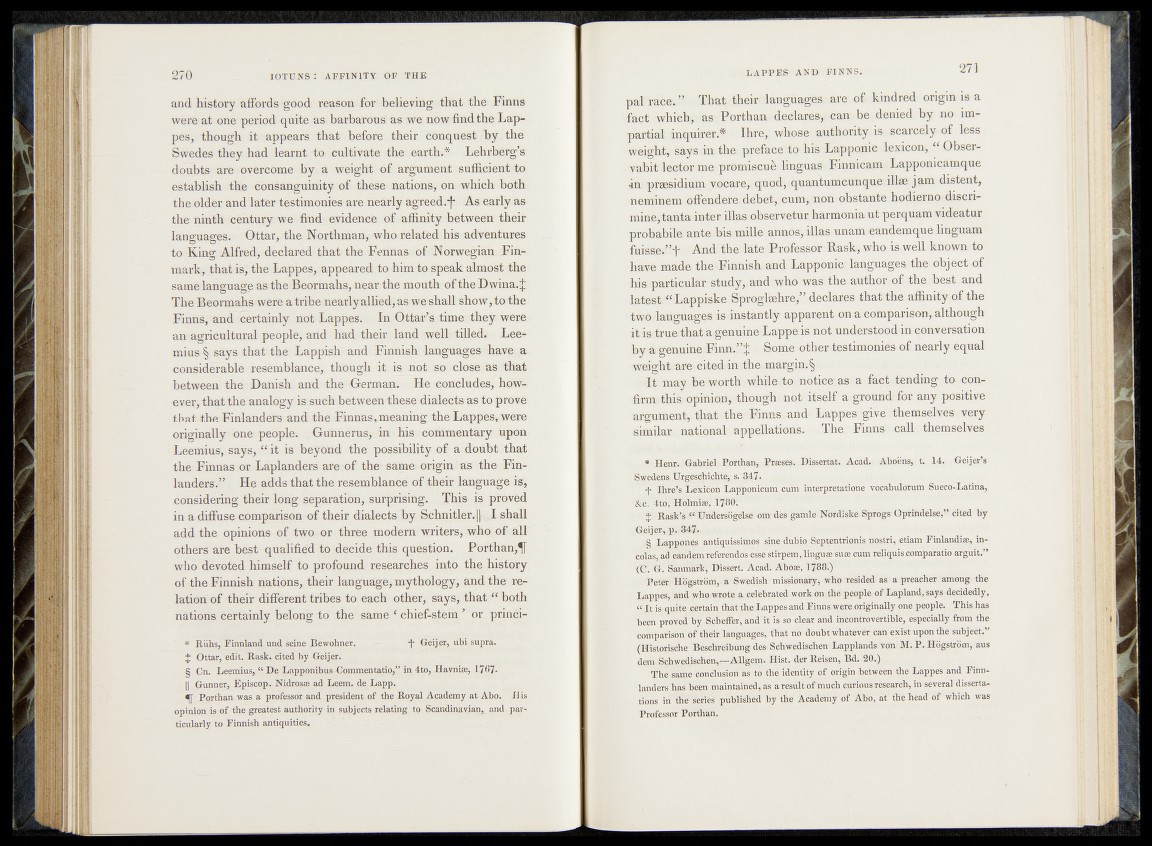
and history affords gdo& reason for: believing that the1 Finns
were at one period quteasx barbarous as we now find the Lappes,
though it appears that before their conquest by thé
Swedes they had learnt to cultivate the earth.* Lehrbévg’s
doubts are overcome by a weight of argument sufficient* to
establish the consanguinity of. these nations, on which both
thepÉierancFlRter t^imonfesarernetólf égr®ed?ff> Asearly as
the ninth century we find evidence of affinity ibètween their
lansruaces. Ottar, the Northman, who related his adventures
t© King Alfred, declared that the Fennas of Norwegian^ Fi®*-
marky that isf the Lappes, appeared to him to speak almost the
same language as the Beormahs, near the mouth of the Dwina.|'
The Beormahs were a tribe-nearly allied, as we shall show, to the
Films, a^k Sartainly not Lappes. In Ottar’s ffteaAfey- were-
an agrieultural people, and had their land well' tillecb; Lee-
mius § says, that the Lappish and Finnish languages have^a
considerable resemblance, though it is not-sói close: as that
between the. Danish and the German. He cpnctedes, hoW-
everj that the analogy is such between these dialects as to prove
that the Finlanders and the Finnas, meaning the L^ppéSiiwére
originally* one people- £ Gukmerus, in his commentary upon
Leemius, says, “ it is beyond thé possibility ofi a doubt that
the Finnas or Laplanders are of the same origin; as the Finlanders.”
He adds that the resemblance of tbèir language is',
considering their long separation, surprising; This k; provpd
in a diffuse comparison of their dialects by SchnitlérM I shall
add the opinions of two or three modem writers, who of all
others are best qualified to decide this question. Porthan,
who devoted himself to profound researches into the history
of the Finnish nations, their language, mythology, and the relation
of their different tribes to each other, says, th a t<c both
nations certainly belong to the same ‘ chief-stem * or princi-
* Riihs, Finnland. und seine Bewohner. — -J- Geijer, ubi. supra.
£ Ottar, edit. Rask. cited by Geijer.
§ Cn. Leemius, “ De LapponibusAkmmientatio,” in 4to, Havnise, 1767«
|| Gunner, Episcop. Nidrosas.ad Lean. de.Lapp.
«r Porthan was a professor and president of the Royal Academy at Abo. His
opinion is of the greatest authority in subjects relating to Scandinavian^,and particularly
to Finnish antiquities.
paRrace*’'’ That*. t'heir'languages are of kindred origin is a
fact «which, as-Porthan*declares,, can be denied by no impartial
inquirer.^ Ibre,* whose;authority. is' scarcely of less
weight, says in.the prefkce$to« his Lapp&k#i$kk3©%:u Obs^*
vabiti:l€k©r’mo.'pEo^ Finricaia Lapponicamque
in praesidium yoeate,; quod, quantumeunque illm jam distent,
«erainer® offender© debed.* cum^non obstaate hodierao discri-
mine^tantaantei? ilia® observetur harmorniiauf perquam videatur
probabile ante bis milfe>;an®os,illas unam eanderaq-ue linguam
fuisses/’t-; And the, late Professor;Rask, who is,well known to
have made the*Finnish-and Lapponic'languages the object-of
hisuparticular- study,, and wh® was the* author of the best and
latest.^Lappiske.SprQglmbre,’’ declares^,thatithe affinity of the
twoilamgiuagest is ■'instantly apparent on a comparison, although
ifcis truedkafea^enu-ine-Lappe is not;understood in conversation
by a genuine ® nm .^ v Some ®the^testknpmes»ofi nearly equal
the m a rg in ^ . ■
It may be worth whil©sst©s;n;©tieei as a faet^tendkg to«eo»-
firmpthi^ opifnon'ythoi^gh not itself, a.ground for any positive
and Lappes givadthemselvest very
similar., national appellations. The Finns;, call themselves
* Henr. Gabriel Porthan, Præses. D isse c t. Acad. A4)oëns,r t. 14. Geijeris
Swedqps.TJrgescliiç^tÿ.s. 347, ,,i .
fvR Ihre’s Lexicon Lapponicurq cum interpréta tione vocabulorum Suecô-Latina,
“$c. 4Vo, Holmiæj 1780.
■ Rask’s. ef ündersögdse om des garnie Nordiste »progs Oprihdelse,” cited by
« #ÿj'e3%^347-.-■ ■ ‘ v -.
ï§ Lappones antiquissimos sine du^io.Septentrion^ nostri, etiam Finlandia, incolas,
ad eandemreférendos esse stirpem, linguae suæ cum reli’quis comparatio arguit.”
G. Sanmafk, Dissert. Acad. Abba, 1788:)
Peter? H%str®m, a SvfeMsh missibiiaay, who resided as a preacher among the
Lappes, and who wrote a celebrated work on.the people of Lapland, says decidedly,
« It is, quite certain that the Lappes and Finns.wqre originally one people. This has
been proved by Scheffer, andAt js so dear and McbUfrovertible, especially from the
comparison of their languages, that no dbubt whatever can exist upon the subject.”
(Historische Beschreibung, des* Schwedischen Lapplands von M. P. Högsfröav, aus
dem Schwedischen,—Allgem. Hist, der Reisen, Bd. 20.)
The same conclusion as to the identity of origin between the Lappes and Finnländers
has been maintained, as a result of much curious research, in several dissertations
in the series published by'tjie Academy of Abo, at the head of which was
Professor Porthan.